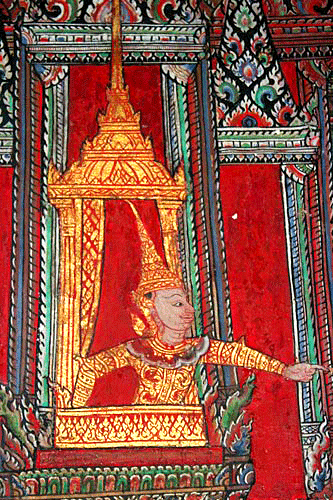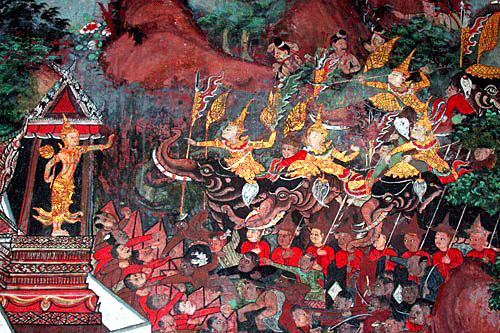————–
MAHOSADHA JATAKA
Mahosadha, the clever Sage

Suddenly in the center a fifth flame arose, which was at first only the size of a firefly. As King Vedeha watched, the fifth flame grew in height and glory until it encompassed all the other pillars of fire. At the same time multitudes of people passed through the flames without harm. Terrified, the king consulted his sages about the meaning of such a scene. The four wise men interpreted the dream to mean that a fifth sage would soon appear who would surpass them all. They themselves represented the four original columns of fire, and they saw in the dream their fame consumed by the growing splendor of the fifth and central flame. And, in fact, on that day a Bodhisatta, or future Buddha, was conceived in the womb of Lady Sumana, the wife of a wealthy merchant in the market town at the east gate of Mithila. At the same instant, a thousand other sons of the gods were conceived in the families of other rich men so that the Bodhisatta would be properly attended.
Nine months later, the Lady Sumana brought forth a child the color of gold who was called Mahosadha. In his hand he clasped a medicinal herb which caused a painless birth for his mother and which cured all the sick who had gathered to see this marvelous infant.
Throughout his childhood Mahosadha grew in wisdom. At the age of seven he demonstrated the architectural talents which would later save both his kingdom and his king from destruction. He built a great hall with many rooms and surrounded it with lakes covered with lotus blossoms. There he would sit dispensing advice to petitioners who needed aid. And his childhood was a happy and peaceful time in all the kingdom, for a Bodhisatta had made his appearance.
Recalling his dream, King Vedeha decided to fetch Mahosadha to his court. The four sages were sent to find him, but they too remembered the prophecy and were reluctant to hasten their own fall from authority. They were so overcome with jealousy that they plotted ceaselessly to keep the Bodhisatta away. Each sage devised trials and riddles intended to prevent Mahosadha from reaching the king’s presence. However, the boy solved whatever was set before him with great cleverness and at last had to be admitted to the court.
For many years Mahosadha instructed the king in matters both spiritual and temporal. At the same time, he had to be on guard constantly against the devious tricks of the old sages. However, he was able to thwart their jealous maneuvering and firmly directed King Vedeha into proper behavior, despite the king’s childish tendency to believe whatever he was told and to obey his impulses regardless of’ the consequences.
During these years one hundred and one kings of India united under the leadership of a wicked sage called Kevatta and set out to conquer the whole of India. However, Mahosadha had not been idle. He had rebuilt Mithila’s defenses and had sent spies to live among Kevatta’s men, so that he was prepared to meet each challenge as it arose. When the kings laid siege to Mithila, Mahosadha was ready.

As the mighty forces approached the city, they were greeted by sounds of a festival in progress. Dismayed by the inhabitants’ apparent lack of fear, the kings conferred and determined to cut off the water supply. Mahosadha responded by causing huge fountains to be built, and water flowed out of the city in prodigious quantities. Realizing that Mithila must have deep wells and vast stores of water, the kings next attempted to starve the city into submission. Whereupon Mahosadha had huge amounts of food dropped over the walls, saying that Mithila had more than it could use. Perhaps the enemy army might be hungry. The hundred and one kings were astonished. They determined to stop all fuel from entering the city, but once again they had no success. Mahosadha caused great pyres of wood to be burned in the moats surrounding the walls, demonstrating that he had an enormous surplus of fuel.
The kings redoubled their efforts to take the city, but to no avail. Mahosadha, watching from the ramparts of Mithila, anticipated their every effort to gain access to the city. Finally, near despair, Kevatta thought of a last ruse: “We shall meet outside the gates,” he proposed, “and Mahosadha will have to salute me, for I am by far the elder. We know that whoever does obeisance is conquered. This is one contest he cannot win.” Mahosadha instantly realized the implications of this challenge and devised a trick which would thwart the wicked Kevatta once again. Having learned from his spies of Kevatta’s surpassing greed, Mahosadha advanced outside the city gates carrying an octagonal gem which glittered enticingly in the sunlight. Pretending to offer it to his enemy, Mahosadha dropped the jewel into the dirt. Kevatta immediately lunged to retrieve it. As he knelt on the ground, Mahosadha held Kevatta’s shoulder blades with one hand and his back with the other so that the grasping sage could not stand up. Holding him thus, Mahosadha shouted loudly, “Rise, teacher, rise! I am younger than you, young enough to be your grandson. Do you no obeisance to me!” Hearing these words, the hundred and one kings and their armies became frightened. If Kevatta had made obeisance to Mahosadha, then they were indeed lost. Without stopping even to retrieve their weapons, they fled.
Furious at his humiliation, Kevatta withdrew to the city of his king, Culani, in order to devise a new plan for defeating Mahosadha and King Vedeha. Finally he perfected a scheme for luring the king into his power. King Culani had a beautiful daughter. Her portrait, along with poems describing her beauty, was sent to Mithila and presented to the gullible King Vedeha. Soon befuddled with passion, King Vedeha determined to have her for his bride. Despite Mahosadha’s warnings of trickery, Vedeha stubbornly persisted in his foolishness and began to plan his journey to Culani’s kingdom. At last Mahosadha decided that he would have to save the king in spite of himself. Obtaining permission to go to Culani’s city four months in advance of Vedeha, he immediately set about outwitting Kevatta and King Culani. With his architectural genius, he proceeded to construct a splendid palace for King Vedeha on the outskirts of Culani’s capital. This was no ordinary palace, for within it was the entrance to an underground tunnel filled with marvels never before seen by man. Embellished like a hall of the gods, its walls were covered with rich paintings and tapestries. Hanging lamps illuminated the passages, which were divided by eighty great doors and sixty-four small, all opening and closing at the touch of a finger. These led into a hundred and one bedchambers, similarly adorned and decorated with statues of beautiful women. The marvelous tunnel led to the royal palace where Culani’s daughter lived and ended in a cave on the mouth of the Ganges river, some distance outside the city walls.
When all was ready, King Vedeha arrived at Culani’s city, only to discover that he was in danger of his life. Waiting inside his new palace to receive his bride, he became aware of ominous numbers of Culani’s troops gathering outside. At first he only questioned his four old sages, for he was ashamed to ask Mahosadha’s advice after disregarding him completely. Each sage in turn shook his head in dismay and counseled suicide as the only alternative to slow death at the hands of the enemy. Finally Vedeha turned to Mahosadha and frantically begged for his help. For a time Mahosadha demurred, pretending that he was powerless, for he wished to impress the king’s folly upon him. At last he revealed the tunnel, and Vedeha and his retinue escaped through its corridors. Meanwhile, Mahosadha’s soldiers crept through the tunnel in the direction of Culani’s palace. Reaching the inner chambers of the palace, they pretended to be forces loyal to Culani. Extolling the riches of the marvelous tunnel, they persuaded the princess and her attendants to enter. They passed along the corridor and through the opulent chambers, each more sumptuous than the last. Finally they arrived at the cave, where they encountered King Vedeha and his retinue.
Although at first alarmed, the princess soon became reconciled to her abduction. She and King Vedeha were married, and with their entourage hastened back to Mithila by barge and fast elephant. In Culani’s palace, the soldiers stole its treasures and strung up the dwarfs and hunchbacks who guarded the interior. Mahosadha returned to the palace he had built and waited for Culani to discover the trick. Soon Culani learned of the disappearance of his family along with King Vedeha and sought out Mahosadha. He was astounded when he was escorted through the tunnel and shown its marvels. At length they reached the mouth of the cave. Suddenly Mahosadha brandished a sword at him, leaped high into the air, and shouted, “Whose are the kingdoms of India?”
Too frightened to speak, Culani cowered on his knees in mute defeat. Mahosadha then laid aside his sword, and the two swore a sincere friendship. The wicked Kevatta was banished and heard of no more. Thus did Mahosadha the Great Being bring a lasting peace to the kingdoms of India.
– Source : www.buddha-images.com




